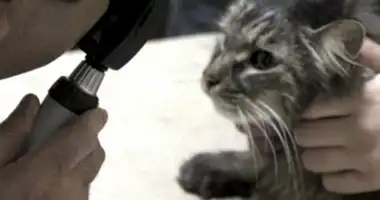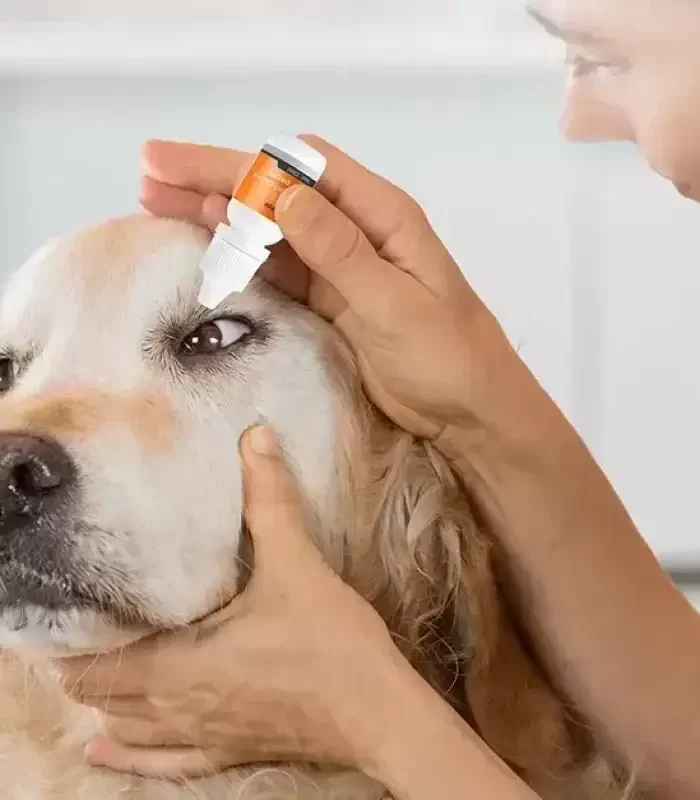Ophthalmology
Expert Pet Eye Care – Veterinary Ophthalmology Brampton
Every thorough veterinarian performs an ocular(eye) exam as a part of an office visit. In addition, emergency ocular problems inevitably occur, including trauma. Both of these scenarios demonstrate the need for specific instruments, medications and drugs for the management of eye care. At McQueen Animal Hospital, our veterinary ophthalmology Brampton services are designed to meet these needs with precision and compassion. Certain breeds such as the Cocker Spaniel, Beagle, Basset Hound, Boston Terrier, and Husky, are predisposed to certain eye diseases such as glaucoma.
The ability to determine intraocular pressure (IOP) is necessary to diagnose, prognose, and treat glaucoma, a condition involving increased pressures in the eye which cause blindness if left untreated. That is why quick and accurate measurement of IOPs is extremely important – the TonoVet, imaged below, very gently measures ocular pressures without the need for excessive handling or local anesthetics.

Common animal ophthalmology Problems Brampton
Eye problems are common with animals and particularly so, with dogs. Animal eye care is nearly similar to human eye care in as much as most problems that affect human eyes also affect your pets. Symptoms of animal eye problems can vary and include swelling, discharge that changes colour from yellow to white or green and change in the consistency of the discharge from the eyes. The eyes may also appear painful with sensitivity to light and reluctance in opening. The eyelids may show discharge and crust and maybe stuck together in severe instances. While these are some of the symptoms, only a veterinary ophthalmologist can diagnose the exact problem and offer appropriate treatment. For advanced and compassionate care, animal ophthalmology Brampton services at McQueen Animal Hospital are here to help. It is also important to understand that untreated and undiagnosed eye problems with your pet can potentially lead to blindness or vision impairment. Therefore, as a pet parent, you should not lose any time getting expert professional animal eye care.
Dry Eye: A very common Problem

Dry eye is an eye disorder impacting the glands responsible for producing the liquid in the tears. When your dog is affected by this disorder, adequate tear film for keeping the eyes well-lubricated is not produced. Consequently, the canine suffers from thickened, dry, irritated, red, or inflamed eyes. Without timely intervention from an expert in veterinary ophthalmology brampton , this condition can lead to more serious consequences including blindness. While the exact cause is often unknown, it is believed to stem from an autoimmune condition. Symptoms of dry eye include inflamed eyelids, redness, protruding third eyelid, thick green or yellow discharge, dry and dull cornea, etc. Only an experienced veterinary ophthalmologist can pinpoint the cause and provide appropriate treatment. However, certain OTC products may help provide immediate lubrication for the eyes.
During an office visit, most veterinarians perform an eye examination. But emergency eye problems inevitably tend to occur and can include trauma. In both these situations, specific medications, instruments and drugs and needed to manage the eye care. Certain breeds like Boston terrier, Husky, Beagle, and Cocker Spaniel are also predisposed to some of the eye problems like glaucoma. Diagnosing glaucoma involves understanding intraocular pressure (IOP), a task that professionals in ophthalmology animal Brampton are well-equipped to handle. Glaucoma, caused by increased eye pressure, can lead to blindness if left untreated, making timely and accurate IOP measurement critical.
Testimonials
Happy Customers with our Pet care service
EXCELLENTTrustindex verifies that the original source of the review is Google. Best staff ever! They are a very passionate, knowledgeable team who make you and your pets feel right at home. Special shoutout to Kate and Nicole—people don’t believe me when I say my pup’s favourite place to be is the vets to see her friends!Trustindex verifies that the original source of the review is Google. amazing!Trustindex verifies that the original source of the review is Google. I cannot express enough gratitude to the incredible team at McQueen Animal Hospital for the care and compassion they showed my beloved dog, Bella. From the moment we walked through their doors, we were met with warmth, professionalism, and genuine concern for Bella’s wellbeing. Bella had ingested potting mix and orchid bark, which caused a severe blockage in her stomach. She was in terrible pain, unable to eat or pass anything, and the initial diagnosis pointed to a high-risk surgery. However, Dr. Padma, with her remarkable expertise and creativity, worked tirelessly alongside Dr. Roshni to explore non-invasive, medical options. Against all odds, Bella made a miraculous recovery without the need for surgery—a testament to their skill, dedication, and innovative approach to care. Dr. Padma truly went above and beyond, and I will always be thankful for her guidance and compassion. Dr. Roshni, Dr. Babbar, and the rest of the amazing staff, including Kate, Priya, Angel and so many others, were all incredibly supportive throughout this difficult time. Their kindness and generosity gave me so much comfort and hope. Thanks to the team at McQueen Animal Hospital, Bella is now back to her happy, healthy self. I wholeheartedly recommend them to anyone looking for a veterinary hospital that truly cares for their patients and goes the extra mile in every way.Trustindex verifies that the original source of the review is Google. We visited this clinic for first time to get our cat neutered and had a great experience. Dr Mullick, staff, technician, front desk are amazing people. They not only took extreme care of our cat but were very patient explaining the details to us both on the phone and during our visit.Trustindex verifies that the original source of the review is Google. Amazing staff, they truly care about your pet!Trustindex verifies that the original source of the review is Google. Nicole is fantastic. She fit us in for an emergency appointment. Dr. Babber is so attentive and patient to answer all my questions. Great team to work with. Would highly recommend.Trustindex verifies that the original source of the review is Google. Best customer service 💯❤️Trustindex verifies that the original source of the review is Google. We've been going to McQueen animal hospital for about 10 years. The front staff is always nice and helpful. And Dr Babar is a great vet and always gives good advice !Trustindex verifies that the original source of the review is Google. They were very friendly and very caring for my dog. The service was awesome.

